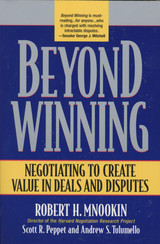
Conflict is inevitable, in both deals and disputes. Yet when clients call in the lawyers to haggle over who gets how much of the pie, traditional hard-bargaining tactics can lead to ruin. Too often, deals blow up, cases don’t settle, relationships fall apart, justice is delayed. Beyond Winning charts a way out of our current crisis of confidence in the legal system. It offers a fresh look at negotiation, aimed at helping lawyers turn disputes into deals, and deals into better deals, through practical, tough-minded problem-solving techniques.
In this step-by-step guide to conflict resolution, the authors describe the many obstacles that can derail a legal negotiation, both behind the bargaining table with one’s own client and across the table with the other side. They offer clear, candid advice about ways lawyers can search for beneficial trades, enlarge the scope of interests, improve communication, minimize transaction costs, and leave both sides better off than before. But lawyers cannot do the job alone. People who hire lawyers must help change the game from conflict to collaboration. The entrepreneur structuring a joint venture, the plaintiff embroiled in a civil suit, the CEO negotiating an employment contract, the real estate developer concerned with environmental hazards, the parent considering a custody battle—clients who understand the pressures and incentives a lawyer faces can work more effectively within the legal system to promote their own best interests. Attorneys exhausted by the trench warfare of cases that drag on for years will find here a positive, proven approach to revitalizing their profession.
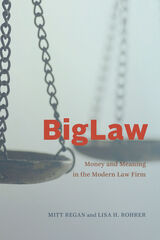

In the struggle against apartheid, one often overlooked group of crusaders was the coterie of black lawyers who overcame the Byzantine system that the government established oftentimes explicitly to block the paths of its black citizens from achieving justice.
Now, in their own voices, we have the narratives of many of those lawyers as recounted in a series of oral interviews. Black Lawyers, White Courts is their story and the anti-apartheid story that has before now gone untold.
Professor Kenneth Broun conducted interviews with twenty-seven black South African lawyers. They were asked to tell about their lives, including their family backgrounds, education, careers, and their visions for the future. In many instances they also discussed their years in prison or exile, or under house arrest. Most told of both education and careers interrupted because of the ongoing struggle.
The story of the professional achievements of black lawyers in South Africa—indeed their very survival—provides an example of the triumph of individuals and, ultimately, of the law. Black Lawyers, White Courts is about South Africa, and about black professionals in that country, but the lessons its protagonists teach extend far beyond circumstances, geography, or race.

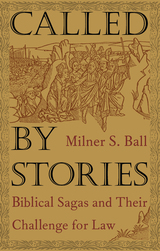
He begins with the story of Moses, who is obliged both to speak for God to the Hebrews and to advocate for the Hebrews before God. What, asks Ball, does Moses’s predicament say to lawyers professionally bound to zealous representation of only one client? In the story of Rachel, Ball finds insights that comprehend the role of tears and emotion in the judicial process. He relates these insights to specific contemporary situations, such as a plant closing and the subsequent movement of jobs to Mexico and legal disputes over the sovereignty of native Hawaiians. In a discussion of “The Gospel According to John,” Ball points out that the writer of this gospel is free simultaneously to be critical of law and to rely extensively on it. Ball uses this narrative to explore the boundaries of free will and independence in lawyering. By venturing into the world of powerful events and biblical characters, Ball enables readers to contest their own expectations and fundamental assumptions.
Employing legal theory, theology, and literary criticism, Called by Stories distills a wisdom in biblical texts that speaks specifically to the working life of legal professionals. As such, it will enrich lovers of narrative and poetry, ethicists, literary and biblical scholars, theologians, lawyers, law students, judges, and others who seek to discern deeper meanings in the texts that have shaped their lives.
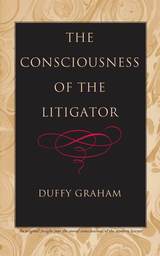
---Kimberly Kirkland, Franklin Pierce Law Center
The Consciousness of the Litigator investigates the role of the lawyer in modern American political and social life and in the judicial process, and plumbs lawyers' perceptions of themselves, their work, and, especially, their sense of right and wrong.
In so doing, the book sheds light on the unique and little-examined subject of the moral mind of the litigator, whose work extends to all corners of society and whose primary expertise---making legal arguments---is the fundamental skill of all lawyers.
The Consciousness of the Litigator stands with Michael Kelly's Lives of Lawyers as a must-read for the many law students, scholars, and practicing litigators who struggle to balance ethical questions with the dictates of their highly commercialized profession.
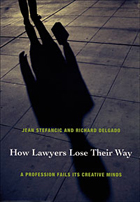
Stefancic and Delgado dramatize the plight of modern lawyers by exploring the unlikely friendship between Archibald MacLeish, who gave up a successful but unsatisfying law career to pursue his literary yearnings, and Ezra Pound. Reading the forty-year correspondence between MacLeish and Pound, Stefancic and Delgado draw lessons about the difficulties of attorneys trapped in worlds that give them power, prestige, and affluence but not personal satisfaction, much less creative fulfillment. Long after Pound had embraced fascism, descended into lunacy, and been institutionalized, MacLeish took up his old mentor’s cause, turning his own lack of fulfillment with the law into a meaningful crusade and ultimately securing Pound’s release from St. Elizabeths Hospital. Drawing on MacLeish’s story, Stefancic and Delgado contend that literature, public interest work, and critical legal theory offer tools to contemporary attorneys for finding meaning and overcoming professional dissatisfaction.
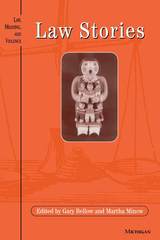
The essays in Law Stories are all first-person accounts of law problems and the way they were handled, written by lawyers involved in the problems. They offer the voice and insight of the self-reflective practitioner. As such they provide us with a dimension missing from many third-person accounts of cases, a layer of emotion and perspective on legal institutions experienced by people caught or working within them.
Focusing on cases arising in public interest practices, the stories deal with problems arising from child custody, parental rights in a Head Start program, the consequences of large corporate bankruptcy for the corporation's retirees, juvenile crime, unemployment benefits, the rights of a victim of crime, the rights of welfare recipients, and the rights of small shareholders. These stories raise a variety of questions, including the nature and extent of the lawyer's role, the way the system listens to certain kinds of stories told in certain ways and refuses to hear other stories, how participation in the legal system affects the identity of those who are involved in it and how the popular image of law and legal processes differs from the reality depicted in these cases.
This book will appeal to both practitioners and teachers of law as well as social scientists interested in studying the role and place of law in the system.
The contributors include Anthony Alfieri, Gary Bellow, Lenora M. Lapidus, Alice and Staughton Lynd, Martha Minow, Nell Minow, Charles Ogletree, Abbe Smith, Lynne Weaver, and Lucie E. White.
"[Law Stories will] enlighten not only law students but the general and professional public who will find these accounts as compelling as any work of popular fiction. Unhappily, these accounts of law's inadequacy as a vehicle for social justice are not fictions. . . ." --Law and Politics Book Review
Gary Bellow and Martha Minow are Professors of Law, Harvard Law School.
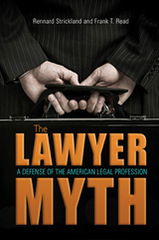
scapegoats for many of the problems of our
age. In The Lawyer Myth: A Defense of the
American Legal Profession, Rennard Strickland and
Frank T. Read look behind current antilawyer media
images to explore the historical role of lawyers as a
balancing force in times of social, economic, and political change. One source of this disjunction of perception and reality, they find, is that American society has lost touch with the need for the lawyer’s skill and has come to blame unrelated social problems on the legal profession. This highly personal and impassioned book is their defense of lawyers and the rule of law in the United States.
The Lawyer Myth confronts the hypocrisy of critics from both the right and
the left who attempt to exploit popular misperceptions about lawyers and
judges to further their own social and political agendas. By revealing the facts and reasoning behind the decisions in such cases as the infamous McDonald’s coffee spill, the authors provide a clear explanation of the operation of the law while addressing misconceptions about the number of lawsuits, runaway jury verdicts, and legal “technicalities” that turn criminals out on the street.
Acknowledging that no system is perfect, the authors propose a slate of reforms for the bar, the judiciary, and law schools that will enable today’s lawyers—and tomorrow’s—to live up to the noble potential of their profession. Whether one thinks of lawyers as keepers of the springs of democracy, foot soldiers of the Constitution, architects and carpenters of commerce, umpires and field levelers, healers of the body politic, or simply bridge builders, The Lawyer Myth reminds us that lawyers are essential to American democracy.
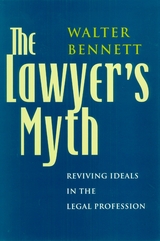
Bennett draws on his experience as a lawyer, judge, and law teacher, as well as upon oral histories of lawyers and judges, in his exploration of how and why the legal profession has lost its ennobling mythology. Effectively using examples from history, philosophy, psychology, mythology, and literature, Bennett shows that the loss of professionalism is more than merely the emergence of win-at-all-cost strategies and a scramble for personal wealth. It is something more profound—a loss of professional community and soul. Bennett identifies the old heroic myths of American lawyers and shows how they informed the values of professionalism through the middle of the last century. He shows why, in our more diverse society, those myths are inadequate guides for today's lawyers. And he also discusses the profession's agony over its trickster image and demonstrates how that archetype is not only a psychological reality, but a necessary component of a vibrant professional mythology for lawyers.
At the heart of Bennett's eloquently written book is a call to reinvigorate the legal professional community. To do this, lawyers must revive their creative capacities and develop a meaningful, professional mythology—one based on a deeper understanding of professionalism and a broader, more compassionate ideal of justice.
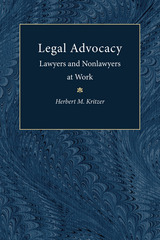
The analysis shows clearly that nonlawyers can be effective advocates and, in some situations, more effective than many lawyers. Kritzer combines an examination of case outcomes with a systematic observation of advocates in the hearing room, providing a compelling portrait of their work and a solid basis for understanding the differences in the effectiveness of advocates with different training. The author's findings have important implications for our policies toward restrictions on those who can provide legal assistance, specialization in training and practice, and the meaning of professional monopolies in a world of increasing complexity.
This book will appeal to student of the legal process, the sociology of professions, and all concerned with the operation of the U.S. legal system.
Herbert M. Kritzer is Professor of Political Science and Law, University of Wisconsin--Madison. He is the author of Let's Make a Deal and The Justice Broker.
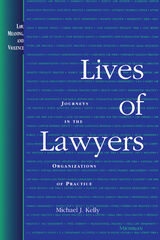
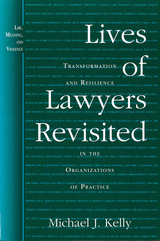
The past two decades have seen profound changes in the legal profession. Lives of Lawyers Revisited extends Michael Kelly’s work in the original Lives of Lawyers, offering unique insights into the nature of these changes, examined through stories of five extraordinarily varied law practices. By placing the spotlight on organizations as phenomena that generate their own logic and tensions, Lives of Lawyers Revisited speaks to the experience of many lawyers and anticipates important issues on the professional horizon.
"Michael Kelly has done it again! His Lives of Lawyers Revisited is a very easy read about some very difficult notions like 'litigation blindness' and law as a business. It presents some fascinating perspectives on our profession."
—J. Michael McWilliams, Past President, American Bar Association
"The best single book about the American realities and possibilities of the American legal profession, combining an empathic and insightful account of law practice with a penetrating analysis of the wider context of professional work."
—Marc Galanter, University of Wisconsin
"Michael Kelly believes that professional values and conduct are not realized in codes, but in the experiences of practice, and that practice draws its routines and ideals from organizations. Through his studies of lawyers in various firms, closely observed and sympathetically described, Kelly reveals how differently organizations adapt to the intense pressures of today's practice environment. His method of linking individual life-experiences to organizational strategies and the external constraints of competition and client demands infuses realism and richness into the concept of professionalism and makes this one of the most interesting and original books on professions and professionalism to appear in years."
—Robert W. Gordon, Yale Law School
"In his two volumes of Lives of Lawyers, Michael Kelly explores legal ethics in an unusual, and unusually rewarding, way. Rather than focusing on rules or arguments, Kelly looks at the kind of lives lawyers lead. Ethics, Socrates thought, is about how to live one's life, and Kelly takes the Socratic question to heart. He explores the institutions lawyers work in and the choices they make. He writes with intelligence, great insight, and above all with heart. This is a superb book."
—David Luban, Georgetown University
Michael J. Kelly is President and Chairman of the Board of the National Senior Citizens Law Center, an advocacy group for older Americans of limited means.

Anthony Kronman describes a spiritual crisis affecting the American legal profession, and attributes it to the collapse of what he calls the ideal of the lawyer-statesman: a set of values that prizes good judgment above technical competence and encourages a public-spirited devotion to the law.
For nearly two centuries, Kronman argues, the aspirations of American lawyers were shaped by their allegiance to a distinctive ideal of professional excellence. In the last generation, however, this ideal has failed, undermining the identity of lawyers as a group and making it unclear to those in the profession what it means for them personally to have chosen a life in the law.
A variety of factors have contributed to the declining prestige of prudence and public-spiritedness within the legal profession. Partly, Kronman asserts, it is the result of the triumph, in legal thought, of a counterideal that denigrates the importance of wisdom and character as professional virtues. Partly, it is due to an array of institutional forces, including the explosive growth of the country’s leading law firms and the bureaucratization of our courts. The Lost Lawyer examines each of these developments and illuminates their common tendency to compromise the values from which the ideal of the lawyer-statesman draws strength. It is the most important critique of the American legal profession in some time, and an an enduring restatement of its ideals.
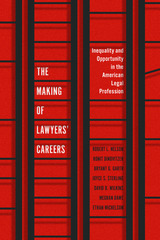
An unprecedented account of social stratification within the US legal profession.
How do race, class, gender, and law school status condition the career trajectories of lawyers? And how do professionals then navigate these parameters?
The Making of Lawyers’ Careers provides an unprecedented account of the last two decades of the legal profession in the US, offering a data-backed look at the structure of the profession and the inequalities that early-career lawyers face across race, gender, and class distinctions. Starting in 2000, the authors collected over 10,000 survey responses from more than 5,000 lawyers, following these lawyers through the first twenty years of their careers. They also interviewed more than two hundred lawyers and drew insights from their individual stories, contextualizing data with theory and close attention to the features of a market-driven legal profession.
Their findings show that lawyers’ careers both reflect and reproduce inequalities within society writ large. They also reveal how individuals exercise agency despite these constraints.
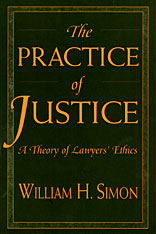
Should a lawyer keep a client's secrets even when disclosure would exculpate a person wrongly accused of a crime? To what extent should a lawyer exploit loopholes in ways that enable clients to gain unintended advantages? When can lawyers justifiably make procedural maneuvers that defeat substantive rights? The Practice of Justice is a fresh look at these and other traditional questions about the ethics of lawyering. William Simon, a legal theorist with extensive experience in practice, charges that the profession's standard approach to these questions is incoherent and implausible.
At the same time, Simon rejects the ethical approaches most frequently proposed by the profession's critics. The problem, he insists, does not lie in the profession's commitment to legal values over those of ordinary morality. Nor does it arise from the adversary system. Rather, Simon shows that the critical weakness of the standard approach is its reliance on a distinctive style of judgment--categorical, rule-bound, rigid--that is both ethically unattractive and rejected by most modern legal thought outside the realm of legal ethics. He develops an alternative approach based on a different, more contextual, style of judgment widely accepted in other areas of legal thought.
The author enlivens his argument with discussions of actual cases, including the Lincoln Savings and Loan scandal and the Leo Frank murder trial, as well as fictional accounts of lawyering, including Kafka's The Trial and the movie The Verdict.

Long ignored by historians and repudiated in their time, practitioners of private law opened the way toward Japan’s legal modernity. From the seventeenth to the turn of the twentieth century, lawyers and their predecessors changed society in ways that first samurai and then the state could not. During the Edo period (1600–1868), they worked from the shadows to bend the shogun’s law to suit the market needs of merchants and the justice concerns of peasants. Over the course of the nineteenth century, legal practitioners changed law from a tool for rule into a new epistemology and laid the foundation for parliamentary politics during the Meiji era (1868–1912).
This social and political history argues that legal modernity sprouted from indigenous roots and helped delineate a budding nation’s public and private spheres. Tracing the transition of law regimes from Edo to Meiji, Darryl E. Flaherty shows how the legal profession emerged as a force for change in modern Japan and highlights its lasting contributions in founding private universities, political parties, and a national association of lawyers that contributed to legal reform during the twentieth century.
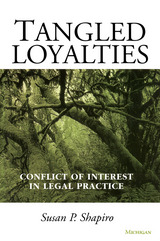
This unique, empirical study examines the actual attitudes and perceptions of legal practitioners. The author discusses the realities of the profession--what lawyers face day to day, how they deal with conflicts of interest, and how those experiences vary from LaSalle Street to Wall Street to Main Street, from megafirms to solo practices. In describing how conflicts arise in their daily work, Shapiro sheds light on the nature of legal work--on clients, colleagues, law firm power and politics, economics, markets, malpractice insurance, careers, ethics, values, business judgments, and lawyers' most anguishing moments. In short, we learn what it means to be a lawyer at the end of the twentieth century.
Tangled Loyalties also looks at how these conflicts in law affect other fiduciaries--accountants, doctors, psychotherapists, journalists, and academics--and the way in which they respond to competing interests and the honoring of those interests.
Tangled Loyalties will appeal to readers interested in the legal and other professions, social institutions and relations, and issues of trust, ethics, social control and regulation.
Susan P. Shapiro is Senior Research Fellow, American Bar Foundation.
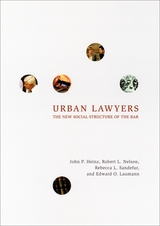
Drawing on extensive interviews with Chicago lawyers, the authors demonstrate how developments in the profession have affected virtually every aspect of the work and careers of urban lawyers-their relationships with clients, job tenure and satisfaction, income, social and political values, networks of professional connections, and patterns of participation in the broader community. Yet despite the dramatic changes, much remains the same. Stratification of income and power based on gender, race, and religious background, for instance, still maintains inequality within the bar.
The authors of Urban Lawyers conclude that organizational priorities will likely determine the future direction of the legal profession. And with this landmark study as their guide, readers will be able to make their own informed predictions.
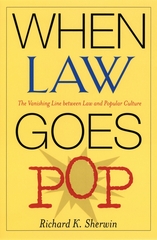
"Sherwin offers insightful, intriguing analyses of movies and other cultural products. His examination of legal discourse and popular culture will inform, enlighten, and even entertain."—William Halton, The Law and Politics Book Review
"[Sherwin's] knowledge of how media culture affects the courtroom is valuable, as is his rigorous examination. Can we prevent America's legal system from going 'pop'—losing its legitimacy by becoming just another part of popular culture? Given America's courtroom obsession . . . it's about time someone did some explaining."—Julie Scelfo, Brill's Content
"[A] brilliant analysis of the jury system in our media-saturated age. . . . [D]iscerning readers will see a truly integrative intelligence at work, proposing possible solutions rather than simply bemoaning problems."—Publishers Weekly
READERS
Browse our collection.
PUBLISHERS
See BiblioVault's publisher services.
STUDENT SERVICES
Files for college accessibility offices.
UChicago Accessibility Resources
home | accessibility | search | about | contact us
BiblioVault ® 2001 - 2024
The University of Chicago Press









